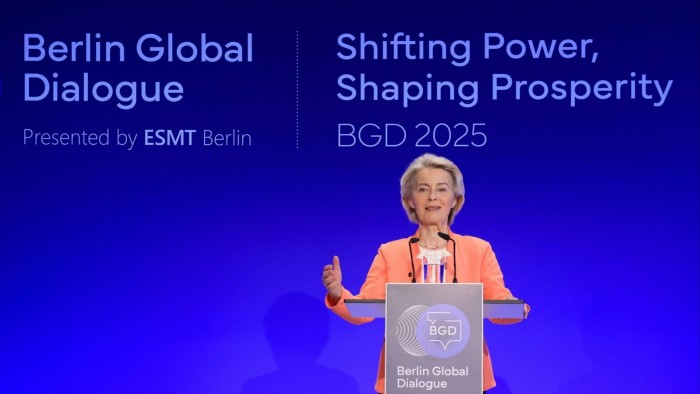Unlock the Editor’s Digest for free
Roula Khalaf, Editor of the FT, selects her favourite stories in this weekly newsletter.
The EU must move quickly to back the critical minerals sector and allow more state intervention after China banned key exports of raw materials, a group pushing for energy security has said.
The next EU budget must include “substantial, dedicated” funding for critical minerals, with money drawn from energy and decarbonisation budget lines, the European Initiative for Energy Security said on Wednesday, following Beijing’s announcement of an export ban earlier this month.
EU policymakers are racing to develop stockpiling strategies as a resource war escalates between Beijing and the west. China dominates many critical mineral supply chains, including rare earths and the battery metal lithium, and its export controls on key metals include rare earth elements and germanium, which is needed in the defence industry.
Europe has limited mining and refining capacity, and Beijing’s restrictions make it more difficult to secure minerals needed to produce military equipment as the bloc tries to re-arm against the Russian threat. Some minerals are also vital to produce green technology such as wind turbines and magnets.
The initiative said institutions such as the European Bank for Reconstruction and Development and the European Investment Bank should consider taking more or bigger equity stakes in mineral projects, mirroring the US government’s recent investment in domestic rare earths group MP Materials.
The EIES is a sister organisation of the SAFE Center for Critical Minerals Strategy, which has partnered with the US state department and investors to create the Minvest partnership. Minvest has contributed to the creation of new funds by major mining private equity firms Orion Resource Partners and Appian Capital Advisory.
EIES, which is funded by philanthropic foundations and corporate donations, is also pushing for the creation of a new European minerals investment network modelled on the US Minvest partnership.
It should “be set up rapidly given the current threat level”, said Albéric Mongrenier, executive director of the EIES.
Washington has moved fast to inject funding into the minerals sector. Orion this month partnered with the US government and Abu Dhabi sovereign wealth fund, ADQ, on a critical minerals fund of up to $5bn, while Appian unveiled a deal with the World Bank to invest $1bn into the sector.
The US on Tuesday signed an agreement with Japan to work jointly on critical minerals projects and potential stockpiling.
European Commission president Ursula von der Leyen on Saturday announced the EU would launch a joint purchasing and stockpiling effort for critical minerals and speed up alliances with other mining countries.
A concrete proposal for the package is expected in mid-November.
The commission is also considering activating emergency legislation that prohibits EU countries from restricting the flow on goods in crises, which would apply to critical raw materials.
A delegation of Chinese officials will be in Brussels to discuss the export curbs with commission officials this week.
Erik Eschen, chief executive of permanent magnet maker VAC Group, said the EU had “finally woken up” with the latest raft of Chinese export controls, telling the Financial Times there were “a lot of emergency calls going on” in response to the tightened rules covering rare earth products.
The priority for policymakers should be to invest in “the right mines and the midstream”. It was “too late” to stockpile because governments would struggle to get the required material “out of China”, he said.
The commission has proposed that part of a new €409bn fund in the next EU budget, which will run from 2028, should be dedicated to critical material supply chains.
Executives have also voiced concern over the UK’s limited support for the mining industry. One said the country was “certainly” losing ground in the global race for critical minerals, with “minimal support” deterring investment.
The UK government said it would “soon” publish a new critical minerals strategy that “will reinforce our supply chains for the long term”.
This story has been updated after the European commission clarified that Chinese officials will discuss export curbs with commission officials
Additional reporting by Laura Dubois in Brussels

